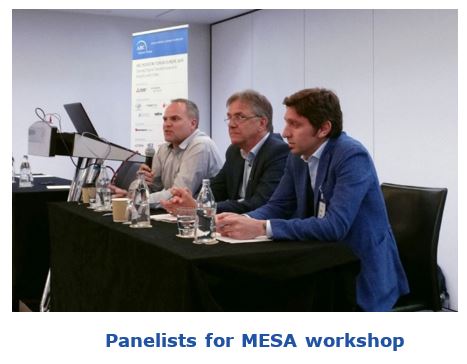


In the traditional MESA workshop at ARC’s European Industry forum, participants gather to talk about ‘hot topics’ in Manufacturing Operations Management (MOM) or MES. This year’s topic was Artificial Intelligence (AI) and machine learning (ML) within MOM. Three panelists, Willie Smit from SASOL, Erik Jan van de Heuvel from Dow, and Pietro Cuttica from sedApta enriched the discussions with their expertise.
In polling the audience’s experience with AI and ML, it appeared that only a few companies succeed in getting corporate value from DT and ML projects. This is consistent with ARC’s findings among other users. The audience identified the following important success factors:
Expanding on the first point, operational data analytics organizations should be inspired or initiated by IS/IT but should reside in cross-disciplinary, more operational or business-oriented organizations, or a mix of those.
The participants judge it important that AI and ML projects do not disrupt operations, and that as a start, unused data should be used rather than adding new data. It is not useful to just collect data, it is just costly and consumes energy, one participant said. Instead, it is important to collect data that are needed to solve business problems. As discussed in more detail in the users-only “Digital Transformation Council” meeting preceding the workshop, Shell decided to find out what results could be obtained with unfiltered data to detect valve performance issues. The company only filtered out data from valves in manual. This approach was also used by Abbott, who filtered out the process data related to the cleaning phases of the equipment in use, to concentrate on the data related to production phases. It is important to use ‘capable’ data as panelist Erik Jan van den Heuvel expressed it.
The audience and panelists also discussed a strategy for big data. A consensus emerged that AI and ML are powerful methods, but it is more rational to start with simple methods and deliver value from those first. For complex problems, multivariate analysis can help, after which first principle models and machine learning can be added. It is not recommended to approach every problem as a complex problem by default. In addition, the human must be in the loop to make sense of data, design the analysis for humans, and apply the results of the analysis and adapt the way of working (procedures or business processes). One person or one category of people is often not representative. They can introduce biases to artificial intelligence. An approach where many different people determine best practices is both a way to generate broadly supported best practices and also create support for a digital supporting system. A participant commented that the potential risk of AI intelligence is that once the data has been transferred to a machine, the knowledge can leave the company.
The way data are collected is important for the application and the analysis. In some cases, the synchronization of time stamping, or frequency of the sampling can be essential.
A global chemical company found that people who generate data need to be educated on the importance of the data they put in, and how they should put in data. Sometimes operators or maintenance personnel generate data that could be misinterpreted, because they are not entered with the understanding of what they are used for. The company will be working on how to improve data literacy. The company has a multi-disciplinary approach to data analytics.
The Shell project to detect issues with valves resulted in the finding that not all valves provide enough data, and even from those, not all valve types can be successfully modelled. However, in one refinery, 150 valves are monitored by model, and many failure modes of valves can be detected and predicted, albeit with different lead times, varying from a few days to a few months. The potential benefits from this project, applied at the scale of a global company is enormous, both in terms of maintenance cost savings and in the avoidance of potential loss of containment or accidents. In the roll-out phase of an AI/ML project, it is important to take the lifecycle management of machine learning models into account.
ARC and MESA are grateful for the rich discussions and thank the panelists for their participation. We thank Michel Devos of the MESA Europe board for helping in preparing and facilitating the workshop. We are interested in receiving your feedback or answering any questions on this or other MOM topics.

